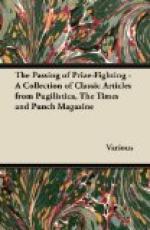I cowered in the smoking-room, unmanned;
The days dragged by and still
the men were here.
And then I said, “I too will take
a hand,”
And borrowed lots of decorating
gear.
I painted the conservatory blue;
I painted all the rabbit-hutches
red;
I painted chairs in every kind of hue,
A summer-house, a table and
a shed;
And all of it was very much more fair
Than any of the work of Mr. Ware.
But all his men were stung with sudden
pique
And worked as never a worker
worked before;
They decorated madly for a week
And then the last one tottered
from the door,
And I was left, still working day and
night,
For I have found a way of
keeping warm,
And putting paint on everything in sight
Is surely Art’s most
satisfying form;
I know no joy so simple and so true
As painting the conservatory blue.
A.P.H.
* * * * *
[Illustration: THE PROFESSOR, IN HIS CAGE, INTENDED TO STUDY THE LANGUAGE OF MONKEYS. BUT, WHEN THE KETTLE UPSET, THE MONKEYS HAD AN OPPORTUNITY OF STUDYING THE LANGUAGE OF PROFESSORS.]
* * * * *
THE LAST OF HIS RACE.
IT is interesting, though ill-mannered, to watch other people at a railway bookstall and guess their choice of literature from their outward appearance.
Had you pursued this diversion, however, in the case of Mr. Harringay Jones as he stood before the bookstall at Paddington, you would, I fear, have been far out in your conjecture. For Mr. Jones, who had the indeterminate baldheadedness of the bank cashier and might have been anything from thirty-five to sixty, did not purchase a volume of essays or a political autobiography, but selected a flaming one-and-sixpenny narrative of spy hunts and secret service intrigue.
Still, how could you have guessed that Mr. Jones’s placid countenance and rotund frame concealed an imagination that was almost boyish in its unsatisfied craving for adventure? Humdrum year had succeeded humdrum year, yet he had never despaired. Some day would come that great moment when the limelight of the world’s wonder would centre on him, and he would hold the stage alone.
But till its arrival he consoled himself with literature and found vicarious enjoyment in the deeds of others. As long as his imagination could grow lean in its search for treasure amid Alaskan snows, he recked not if reality added an inch or two to his circumference. While he could solve, in fancy, problems that had baffled the acutest investigators, what matter if his tie-pin got mislaid?
And then came war to deposit romance and adventure upon our doorsteps. Mr. Jones was agog with excitement.
Espionage, treachery in high places, the hidden hand—Mr. Jones read about them all and shuddered with unholy joy. Perhaps he, an obscure cashier—who could tell? Stranger things had happened.




